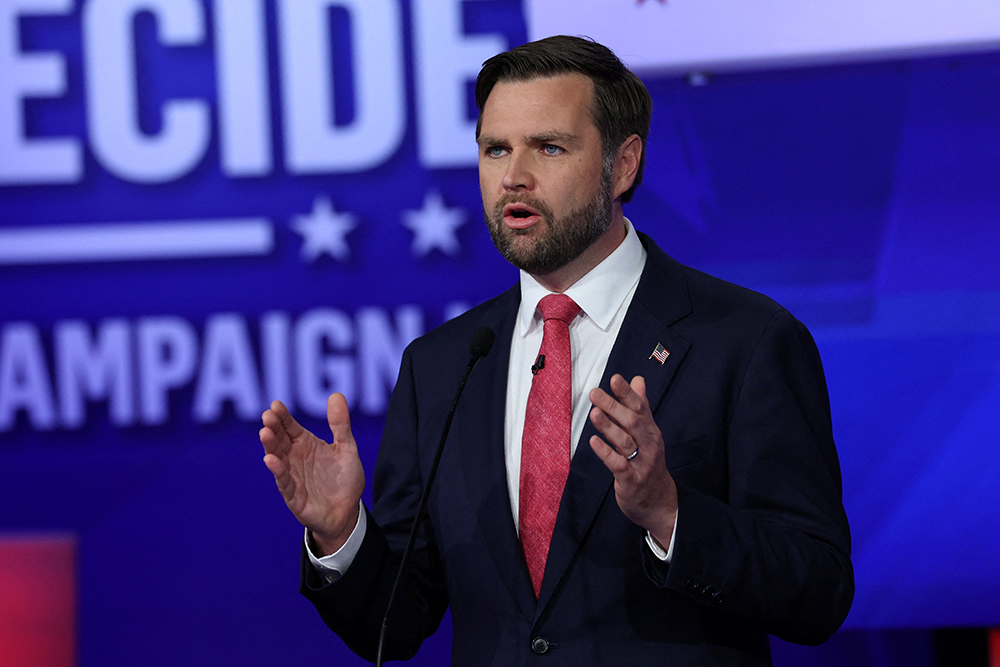
Republican vice presidential nominee Sen. JD Vance of Ohio, gestures during his first and only debate with Minnesota Gov. Tim Walz, the Democratic vice presidential nominee, at the CBS Broadcast Center in New York City Oct. 1, 2024. (OSV News/Reuters/Mike Segar)
In the last week of August, a video resurfaced of Republican vice presidential candidate JD Vance at a forum hosted by the Center for Christian Virtue in 2021. In his speech, Vance criticized the president of the American Federal of Teachers and other "leaders on the left" for not having children.
This came on the tail of the viral resurfacing of a 2021 Fox News interview with Tucker Carlson, wherein Vance called women without biological children — including Democratic presidential candidate Kamala Harris — "childless cat ladies."
Unsurprisingly, these comments did not land well with the general public. Teachers were quick to point out that Catholic sisters — women without children — have long served as school teachers without being judged for their personal reproductive choices. Meanwhile, Harris supporters wasted no time using the insult to advance her campaign; even pop star Taylor Swift signed her public endorsement of Harris as "Childless Cat Lady."
Vance took a slight step back on the The Megyn Kelly Show in July, saying he was not devaluing adults without children but rather emphasizing that the Democratic Party is "anti-family," an accusation that he and former President Donald Trump have both repeatedly launched at Harris' — and formerly, Biden's — campaign.
From a historical perspective, Vance's comments reek of the dark history of natalism, a sociopolitical framework promoting reproduction and exalting the role of the parent. He has even gone so far as to argue for increased taxes for adults without children and suggested lessening their voting power. Extreme, yes; but he is not alone. A wider natalist movement with historical roots is gaining traction today among American conservatives, including conservative Catholics.
Advertisement
To understand natalism, we must recall the Social Purity Movement of the late 19th century. This Christian moral reform movement sprouted right after the Civil War and centered on purity of mind and body, specifically female virtue through laws against prostitution, contraception, abortion and abstinence from alcohol. Anti-vice activist Anthony Comstock was a key figure in this movement and, with the support of the Young Men's Christian Association in New York City, an anti-contraceptive bill bearing his name passed on March 3, 1873.
However, as historian Sara Moslener discusses on her podcast Pure White, these "anti-vice" goals were deeply rooted in racism. As a new wave of immigrants from southern and eastern Europe entered the United States and former enslaved individuals traveled north following the war, efforts to "protect" women were really only concerned with safeguarding mothers of a pure, white, Christian race. The calls for temperance and anti-obscenity were built on the control of women's bodies and erroneous theories surrounding women's sexuality.
The Social Purity Movement fed into the Eugenics movement of the early 20th century. Rooted in the theory of "planned breeding," eugenics encouraged societies to achieve "racial improvement" and eliminate social vices, as social purity proponents attempted to do before the turn of the century. Proponents sought to improve the genetics of human populations, and eugenics was used to prohibit the marriage of — and carry out forced sterilization upon — impoverished and disabled women, especially disabled women of color.
While some people were kept from having children, the Eugenics movement relied on natalism, the philosophy that having children was a moral good and imperative to the survival and perfection of a race. The term natalism itself is relatively young, dating to 1971, but the philosophy was integral to extremist nationalist movements like Nazism in 1940s Germany, which used eugenics to justify genocide in order to breed an ideal Aryan race. Lebensborn was a Nazi Germany association, established by Heinrich Himmler, with the goal of increasing the birth rate of Aryans. German mothers who bore a large number of Aryan children were awarded the Cross of Honour of the German Mother.
A wider natalist movement with historical roots is gaining traction today among American conservatives, including conservative Catholics.
In his manifesto Mein Kampf, Hitler attacked interracial families, arguing that "all great cultures of the past perished only because the original race died out because of blood poisoning." Thus, many individuals drew historical parallels when Trump said at a December 2023 rally in New Hampshire that immigrants entering the United States are "poisoning the blood of our country."
Vance, then Ohio senator, defended Trump's remarks, arguing that "he didn't say immigrants were poisoning the blood of this country. He said illegal immigrants were poisoning the blood of this country, which is objectively and obviously true to anybody who looks at the statistics about fentanyl overdoses." Vance scoffed at the suggestion that Trump's comment was reminiscent of Hitler, calling the insinuation deeply offensive.
But there is no denying a correlation between extremist conservative politics and the fact that natalism is on the rise. This summer, the Heritage Foundation, behind Project 2025, published a piece on how low birth rates are resulting in pro-natalism. Natalism has gained traction among politically conservative groups who are fearful of falling birth rates and increasing immigration to the United States.
Just as Protestant Christianity was a key part of Germany's violent fling with natalism, far-right Christianity today has a firm place in conservative extremism. Vance, who was raised Protestant but converted to Catholicism in his 30s, is part of a growing shift of young converts to Catholicism and Eastern Orthodoxy who are seeking out traditions that were removed during the Second Vatican Council.
Within this segment, a surprising amount of young people are adopting philosophies that emphasize traditional gender roles, family values and the so-called protection of feminine virtue and childhood innocence. Many but not all seek out Catholic schools or homeschool their children, believing, like Vance, that their children are at risk of being indoctrinated in a public school setting. Some Catholics have even withdrawn from wider society and established their own sustained towns, like that in St. Mary's, Kansas.
It should go without saying that parents indeed play a vital role in both the Catholic Church and U.S. society. But Vance's comments about individuals who do not or cannot have children demonstrate the threat of natalism to potentially sinister social ends — and don't sound much like Jesus, himself a childless lay teacher, after all.








